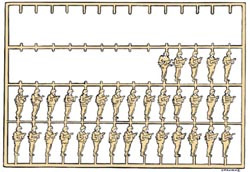 |
 |
 |
 Editorials | Issues | September 2007 Editorials | Issues | September 2007  
Battle Lines Drawn for Bush, Congress on Iraq
 Agence France-Presse Agence France-Presse
go to original


| | Next! (Art: Chaumaz/Le Monde) |
Washington - President George W. Bush and his Democratic foes in Congress this week fire the opening shots in a long-brewing clash likely to seal the fate of US war strategy in Iraq.

Lawmakers return from their summer break for a week of hearings and political theater to set the stage for Bush's critical progress report on the war, due by September 15.

Then, in the week of September 9, war commander General David Petraeus, and US ambassador to Baghdad Ryan Crocker will make one of the most significant appearances in Congress for years, to deliver their verdicts on the war.

At stake is the fate of Bush's last-ditch strategy to 'surge' 28,500 extra troops into Iraq, after a highly unpopular four year-war which has killed more than 3,700 US troops and tens of thousands of civilians.

The president wants to push the surge into early next year, but Democrats are set to try again to force him to bring home most combat forces by May.

Bush argues there are unmistakable signs the strategy has dampened violence in Iraq, after Sunni tribes changed sides to battle Al-Qaeda in Anbar province.

"Our troops are seeing this progress that is being made on the ground," Bush said on Tuesday.

"Will their elected leaders in Washington pull the rug out from under them just as they re gaining momentum and changing the dynamic on the ground in Iraq?"

An intense Republican media offensive is underway, with television advertising, and comments by top officials and commentators, seizing on assessments of military progress by academics who visited Iraq US generals.

The president's former chief speechwriter Michael Gerson last week declared in a Washington Post column of a "season of hope in Iraq."

"A few months ago, it was the received wisdom that Iraq was in the midst of a rapidly escalating civil war. That claim is no longer plausible," Gerson wrote.

But Democrats, including 2008 presidential hopefuls, argue that though violence might be down, any lull is only temporary, and warn US troops are locked in the middle of a civil war.

Though they control Congress, Democrats have however repeatedly failed to force Bush to accept timetables to get US troops home by early next year.

Now, senior Democrats are trying to damn Bush's policy with the president's own words, recalling that the rationale of the surge was to promote political reform.

"Clearly, the purpose of the surge was to give the government time, breathing room give it time to energize, interact and come together," said New York Democratic congressman Michael Arcuri.

"That has not happened - they have squandered the time we gave them."

A senior Democratic aide said this week's hearings would form a "constant drumbeat" of pressure ahead of the Petraeus and Crocker appearances.

This Tuesday and Wednesday, three hearings in the House of Representatives and the Senate will examine a report by the Government Accountability Office, (GAO) which reportedly says the Iraqi government has fallen woefully short of benchmarks for progress set by Congress.

Democrats will use the GAO report to accuse the White House of painting a falsely sunny picture of events there.

Later in the week, former top US commander in Europe General James Jones will report to lawmakers on the status of the Iraqi armed forces.

Despite a battered image, and a clutch of political woes, Bush and top aides have made a robust case for the surge, and appear to believe the threat of mass Republican desertions has receded.

Since Democrats only have a slender majority in the US Senate, and the chamber's rules require a 60-vote margin for key legislation, they need to win over wavering Republicans to force Bush's hand.

So far, only a handful of Republican senators have broken with Bush.

But senior Democratic Senator Joseph Biden believes constant political heat, with congressional elections looming in 2008, may soon pay off.

"I think that you're going to see a very, very deft dance going on between now and the beginning of November before we have a chance to get to the point where we have something approaching a 60-vote majority in the United States Senate." | 
 | |
 |



